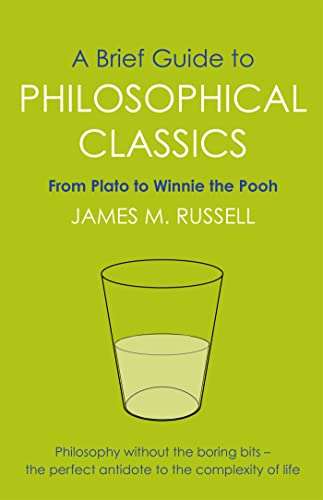Published by Robinson, 2015, softcover, index, 292 pages, condition; as new.
Big ideas sometimes come from the strangest places. In this wide ranging introduction, James M Russell takes the fear out of philosophy and selects seventy-six works - from Plato, Descartes and Wittgenstein to Philip K Dick and the Moomins as well as contemporary thinkers such as Peter Singer and John Rawls. Dividing into accessible sections - history, contemplation, happiness, and -isms, Russell gives us the lives as well as the lessons of the great thinkers, including a digest of their key ideas. A perfect antidote to the complex life.
Traditional Philosophy: The Republic , Plato; The Confessions , St Augustine; The Leviathan , Thomas Hobbes; On Liberty , John Stuart Mill; Philisophical Investigations , Ludwig Wittgenstein; Critique of Pure Reason , Immanuel Kant. Outsiders: Fear and Trembling , Soren Kierkegaard; Beyond Good and Evil , Frederick Nietzsche; The Outsider , Albert Camus; Doors of Perception , Aldous Huxley. Contemplation as Philosophy: The Prophet , Kahil Gibran; Jonathan Livingston Seagull , Richard Bach; Zen and the Art of Motorcycle Maintenance , Robert Pirsig; The Tao of Pooh , Benjamin Hoff. The Continental Tradition: The Prison Notebooks , Antonio Gramsci; The History of Sexuality , Michel Foucault; Symbolic Exchange and Death , Jean Baudrillard. How to Live Your Life: The Art of War , Sun Tzu; Maxims, La Rouchefoucauld; Memories, Dreams, Reflections , Carl Jung; On Sexuality , Sigmund Freud; On Becoming a Person , Carl Rogers. Political and Personal Issues: Das Kapital , Karl Marx; Being and Nothingness , Jean Paul Sartre; Gaia , James Lovelock. Modern Philosophy: A Theory of Justice , John Rawls; Darwin's Dangerous Idea , Daniel Dennett; After the Terror , Ted Honderich.
In A Brief Guide to Philosophical classics, Russell aims at introducing some of philosophys most important books to the reader who is just starting to discover this new realm in a simplified way that makes the book accessible to everyone regardless of their background or previous knowledge on the topic. These can vary between first year philosophy students and anyone merely interested in the field of philosophy and wanting to discover and learn more. It is a worthwhile read because it organizes the different categories of different kinds of philosophies at different periods in time in the shapes of books written about them which allows for the beginner reader to have some sort of set timeline or groups of philosophies back to in addition to a bibliography of where they can start to learn more about it.

